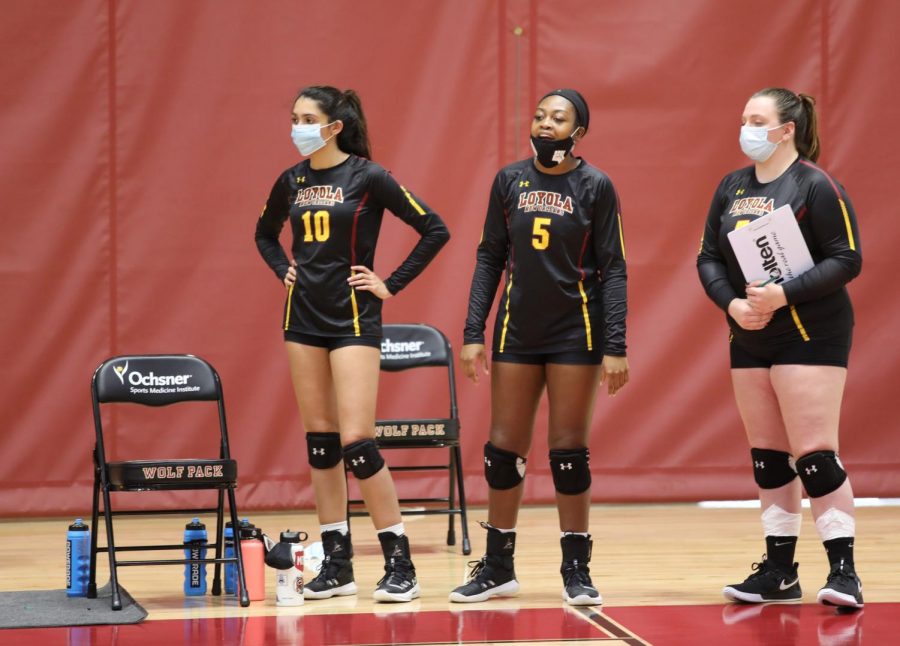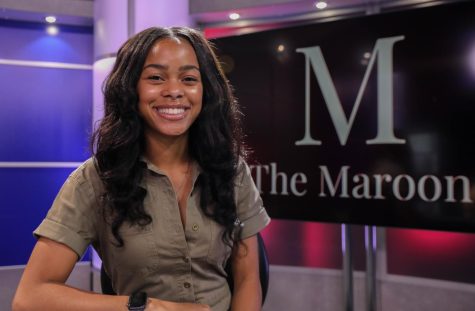Wolf Pack volleyball’s Jordan Bernard bounces back from injuries
Jordan Bernard (5) cheers on her teammates from the sideline during the Wolf Pack’s victory against Brewton-Parker on March 13. Bernard has battled back from several injuries she suffered earlier in her Loyola career to get back on the court. Photo credit: Hannah Renton
March 20, 2021
For most people, an injury is a nuisance — often unwanted and bothersome, but usually resolved in a few weeks time. For an athlete, an injury can threaten their very livelihood.
When Jordan Bernard, an outside hitter for the Loyola volleyball team, was hurt her freshman year, she knew the road to recovery would be tough.
“Growing up, I’ve never been one to be injured,” said Bernard. “I never had any big or small injuries. I’ve never even rolled an ankle. So my freshman year when I hurt my back, I was like ‘this is different.’ My body had never been in that much pain before.”
Bernard had a stress fracture in her back and needed to sit out the rest of her first season to ensure that she would be fit to play her sophomore year. Despite the time off, Bernard would face more injury challenges when she returned to campus the following year.
“For hitters, there’s a lot of jumping, a lot of movement,” Bernard said. “When you see someone have knee surgery they are most likely a hitter. We are constantly jumping off the floor and at some point you’re going to land wrong or you’re going to hit the floor wrong.”
Bernard experienced this firsthand, five matches into her sophomore year. In a match against Dillard University, Bernard said she injured her knee while going after the ball. After having multiple MRIs, she received surgery before starting physical therapy a week and a half later.
“We had a lot to do in a short amount of time,” said Bernard. “The goal for PT was for my knee to be a healthy knee. I needed to be able to do everything I could do before I had the surgery.”
The outbreak of COVID-19 presented a new obstacle for Bernard. She was forced to return home to Austin, Texas where she said she initially struggled to find a new physical therapist. Not wanting to delay her recovery, however, Bernard had to improvise.
“I had to do things on my own in the beginning. I would ride my bike around the neighborhood and I would run, anything just to get my knee moving until we found someone,” Bernard said.
Despite her best efforts, when Bernard traveled back to New Orleans for the fall semester she found it difficult to get back to the level of play she’s accustomed to.
“I was out for a whole year so my body wasn’t used to me playing at such a high level,” said Bernard. “I had to recondition everything and of course sometimes my knee would start to swell or there would be discomfort in my back.”
For many athletes, the psychological impact of an injury can linger long after they are cleared to play.
“For me to step back on the court was something different,” Bernard said. “I had a bit of PTSD. I could still remember that one movement I made that caused me to have knee surgery. So anytime I had to make a movement like that in the beginning I was like, ‘no I can’t do it’.”
Despite the discomfort, Bernard says she wishes it didn’t take her so long to get back on the court. In recent months, she’s been able to reconnect with her team and learn to trust herself again.
“Last year, I only played five games with the sophomores so I never really got to connect with them on the court. Now I finally get to play with them,” said Bernard. “The good news is we finally get to mesh and iron things out.”
Her recovery process has been long and occasionally daunting, but Bernard is excited to be playing again.
Her freshman year she played in 24 matches and had five double-doubles between kills and digs. In this year’s SSAC opener against William Carey University, she recorded her first double-double of the season, with a team-high of 13 kills and 11 digs, according to Wolf Pack Athletics.
“I feel like things would be different if I didn’t have the injury,” said Bernard. “There’s a lot of what-ifs, but I’m grateful and glad to be where I am right now.”








